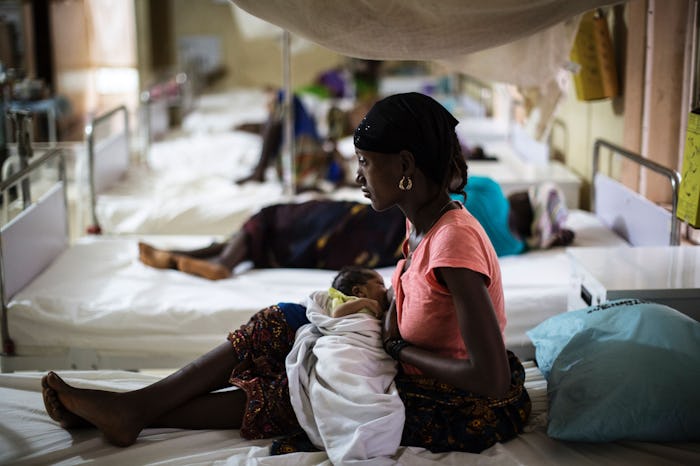News

Breastfeeding One Hour After Birth Gives Babies Their ‘First Vaccine,’ UNICEF Says
Breastfeeding provides a bounty of perks and benefits for both moms and babies. Filled with strong antibodies, breast milk can help your baby fight off viruses and bacteria. It can lower their chances of having asthma, allergies, and some cancers as well as bumping up your baby’s IQ. Also, nursing saves money on formula and helps moms stay fit by burning up to 500 calories a day. Adding to an already plentiful list, The United Nations Children’s Fund (UNICEF) says breastfeeding one hour after birth gives babies their "first vaccine."
According to the organization, warned that about 77 million newborns around the world – or 1 in 2 – are not breastfed within the first hour of being born, which can deprive them of essential nutrients and antibodies that could help them fight off illnesses in the future.
"Making babies wait too long for the first critical contact with their mother outside the womb decreases the newborn’s chances of survival, limits milk supply and reduces the chances of exclusive breastfeeding," UNICEF Senior Nutrition Adviser France Bégin said in a press release. "If all babies are fed nothing but breast milk from the moment they are born until they are six months old, over 800,000 lives would be saved every year."
According to the press release, breast milk works as a baby’s first vaccine and delaying breastfeeding even by two hours (and up to 23 hours) increases the risk of the infant dying in the first 28 days by 40 percent and by 80 percent if breastfeeding is delayed by more than 24 hours.
"Breast milk is a baby’s first vaccine, the first and best protection they have against illness and disease," according to Bégin. "With newborns accounting for nearly half of all deaths of children under five, early breastfeeding can make the difference between life and death."
But, according to a UNICEF analysis, new moms worldwide aren’t breastfeeding immediately after giving birth because they don’t get the help or vital information they need, even when a doctor, nurse, or midwife assists with the delivery.
"In the Middle East, North Africa and in South Asia, for example, women who deliver with a skilled birth attendant are less likely to initiate breastfeeding in the first hour of life, compared to women who deliver with unskilled attendants or relatives," according to the press release.
The news release comes just in time for World Breastfeeding Week, which is celebrated annually from Aug. 1-7 in over 170 countries to promote breastfeeding and improve infant nutrition. This year's theme plans to focus on how breastfeeding is a key element for well-being from the moment a baby is born and last year's aimed to end poverty and protect the planet through breastfeeding.
Any amount of breast milk is beneficial for newborns by increasing their chances of survival and a healthy life in the future. And while this data mostly reflects babies in underdeveloped countries, it's ultimately and fully a mother's choice whether or not they decide to nurse their child. Breastfeeding and formula have their own sets of unique perks and challenges, but it's always amazing to learn another way a mother's body can provide for her bundle of joy.